Dental Implants in Charlotte, NC
Dental implants are a very reliable source for effective tooth replacement. Whether you have lost one tooth or many, implants can provide a permanent solution that looks and functions naturally.
Dental Implants at Carolina Complete Dentistry
Dental implants are special posts made of titanium alloy or ceramic material which are surgically placed into the jawbone to replace missing teeth or to support a denture. These posts act as an artificial root for a crown when they are used to replace individual teeth. Dental implants stabilize bone levels and can prevent bone loss, resulting in better long-term support, function, and esthetics.
Dental implants require less adjustment or shaving of surrounding teeth compared to other restoration methods such as dental bridges. They are also more flexible and provide a more natural feeling than bridges or full or partial dentures.
Schedule Online Today Call For Your Consultation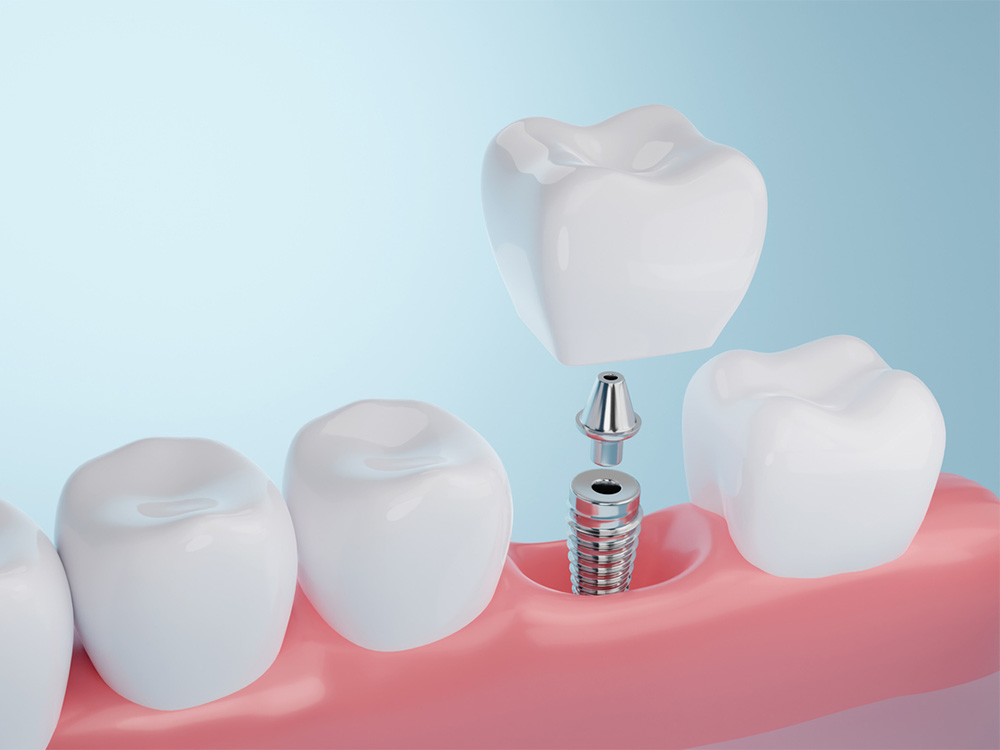

How Much Do Dental Implants Cost?
At Carolina Complete Dentistry, we provide high-quality affordable dental care so our patients can always receive the treatment they need. Every case is different so the cost of dental implants varies based on the placement of the implant, materials used, insurance coverage, and other factors. Our office is always happy to provide you with updated estimates on the cost of a procedure after your initial consultation. The cost of a fully restored tooth is:
- Between $3883 to $4856.
We know many patients are concerned about cost, payment plan options, and insurance coverage when considering dental implants. To make dental care more accessible, we offer a dental membership plan for those without insurance that comes with a 15% discount on dental implants. If you need just a single implant, you could save $328 after membership fees.
Learn More Our Dental Membership PlanDental Implant Process at Carolina Complete Dentistry
- Consultation & Exam. To decide if dental implants are the right restoration method for you we will conduct a full exam, including a special x-ray called a CBCT scan, and discuss your treatment options.
- Tooth Extraction & Bone Grafting. If any teeth need extraction that will be scheduled after a treatment plan is established. This will also require some recovery time to ensure the site is ready for the implant procedure. Any bone grafting required to support the implant will then take place which will require at least a few months to heal.
- Implant placement. Once the site is ready the implantation can take place. The implant will be placed into the jawbone and a healing cap will be placed over the implant. This is followed by regular check-ups to ensure proper healing.
- Implant healing. After your implant is placed, osseointegration begins. During this, your jawbone heals around the dental implant providing a solid base for your new artificial tooth. This process takes approximately 3 months.
- Abutment & Crown Placement. Once healing is complete the abutment or connecting piece, and replacement tooth, or crown, can be placed.
Dental Implant Smile Gallery
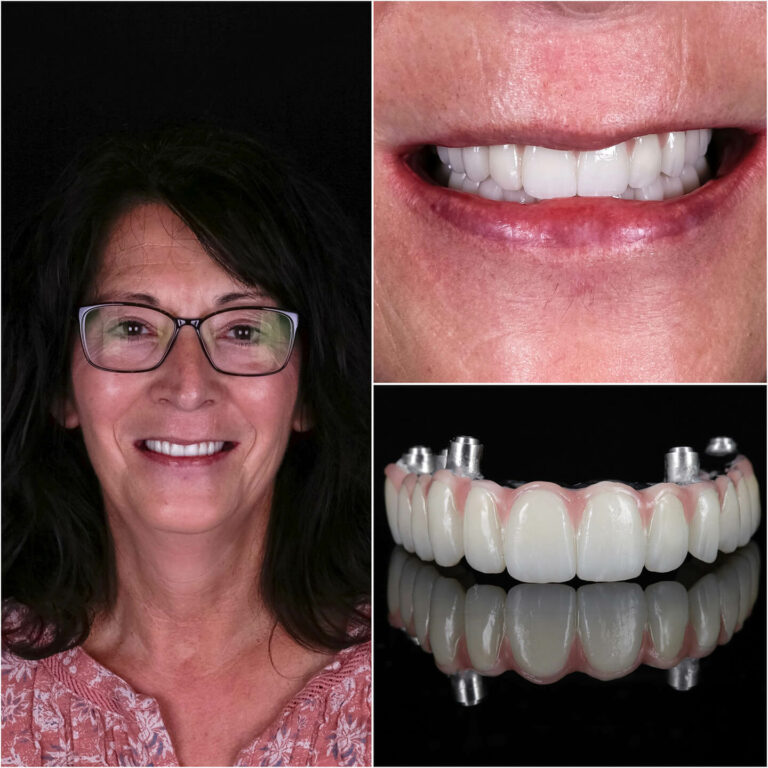
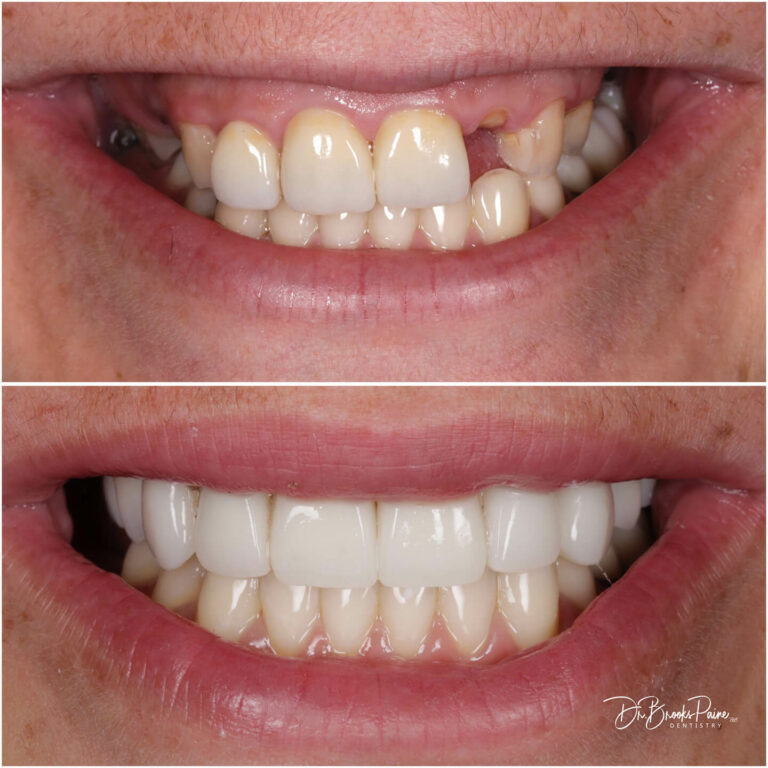
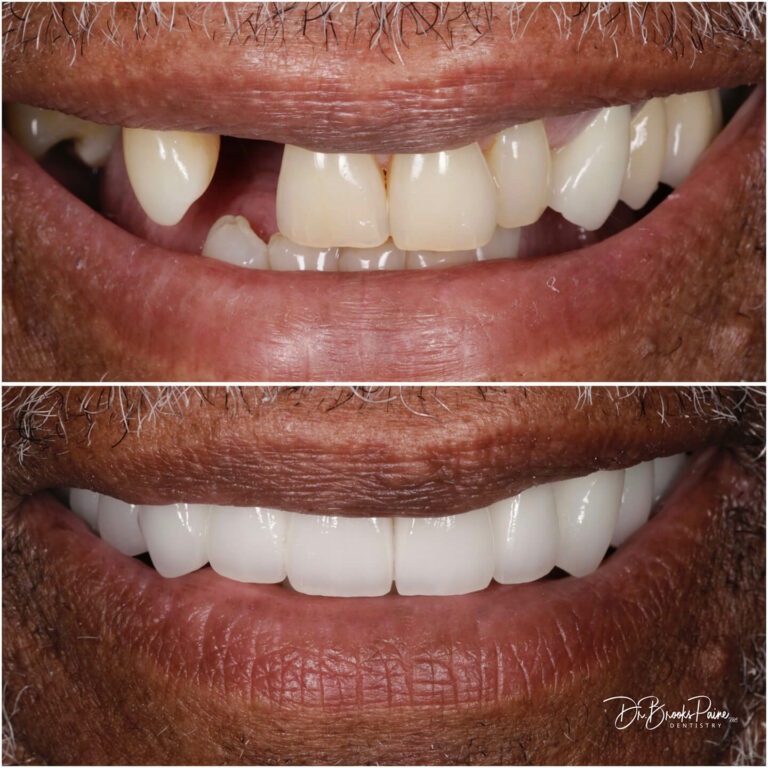
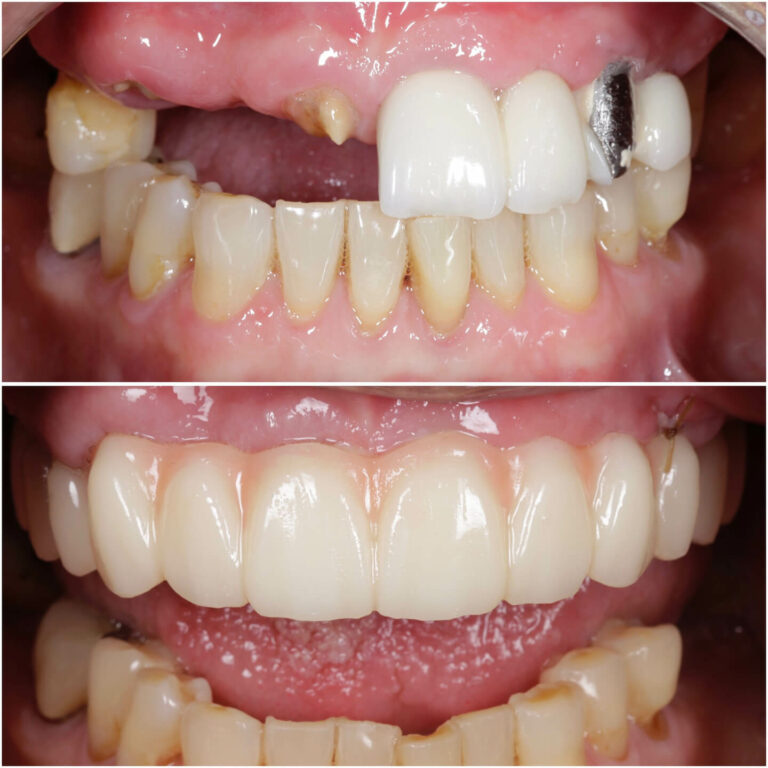
Your Dental Implant Dentist

Dr. Brooks Paine
Dr. Brooks Paine has extensive training in dental implant placement. Dr. Paine has continued his education after dental school with a focus on dental implants including a mini-residency at the Practical Dental Learning Center, courses from the Kois Center, and Neodent implant training. Begin your treatment with confidence knowing that you are in good hands with an extensively trained and experienced dentist, Dr. Brooks Paine, managing your treatment.
FAQ
-
How long do dental implants last?
Dental implants themselves are meant to last a lifetime. The post itself will fuse with your jawbone and should never require replacement or further intervention unless rare complications occur. Dental crowns, or the artificial tooth itself, that is attached to the dental implant can have a lifetime of between 10 and 30 years. Dental crowns require the same care as normal teeth. With twice-a-day brushing, flossing, and regular dental checkups the lifespan of your crown can be greatly increased.
-
Are dental implants painful?
The most painful part of the dental implant process is extracting any teeth that implanted crowns will replace. However, any extraction will include anesthesia meaning little to no pain during the procedure and only a few days of recovery. Any pain experienced during recovery should also be manageable using over-the-counter medications such as ibuprofen.
-
Are there any aftercare instructions for dental implants?
Immediately after dental implant placement, you should be careful not to disturb the placement site. This means no chewing near the implant. It also requires very careful cleaning for several weeks to a month after placement. The dental implant takes several months to fuse to the jaw so the fewer disturbances during that period the better. If you have a temporary denture to replace your missing dentition, the denture must not rub on the surgical site.
After implantation, and extraction or grafting if required, you may experience typical discomforts associated with any oral surgery. These can include swelling, pain at the site, and minor bleeding. Below are some specific recommendations for the first 2 weeks after any procedure during this process to ensure proper healing and recovery.
Pain Management. Ibuprofen reduces pain and swelling and is highly recommended after surgery.
Oral Hygiene. Gentle brushing is important to keep the recovering area clean and to avoid irritation from overly aggressive brushing. Warm salt water rinses can also help keep the area clean and reduce pain and swelling.
Minor Bleeding. After oral surgeries, it’s common to have a small amount of blood in your saliva for a day or two. Gently biting on a gauze pad for 30 minutes can help with this. If bleeding continues for more than a few days, contact our office.
Swelling. Besides ibuprofen and saltwater rinses, periodically using an ice pack on the cheek near the affected area can help.
-
Can a misaligned bite affect dental implants?
If you have a misaligned bite, the restorations placed on the dental implants will be at greater risk for fracture or failure. Proper alignment of the teeth before dental implant placement leads to a more esthetic result. Bite and tooth alignment problems should be addressed before dental implant placement.
-
Are there any risks to getting dental implants?
Dental implants are a very safe and effective type of restoration dentistry. However, there is a small chance that the dental implant will fail to integrate with the jawbone and have to be removed. Certain medical conditions can put you at a higher risk for implant failure. As with any surgery, there is a potential risk of surgical complications when placing a dental implant. Improperly positioned dental implants can make it difficult- if not impossible – to place a useful dental restoration in the mouth. Implant-supported restorations do not have the same feeling as a normal tooth and it is possible to put too much pressure on them when chewing, leading to damage to the implant-supported crown or an adjacent tooth.
